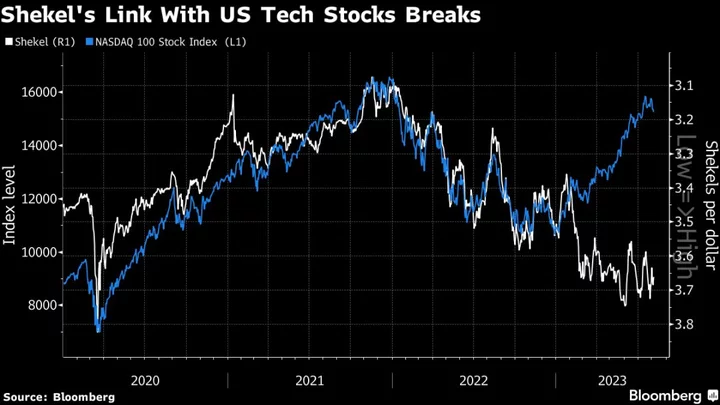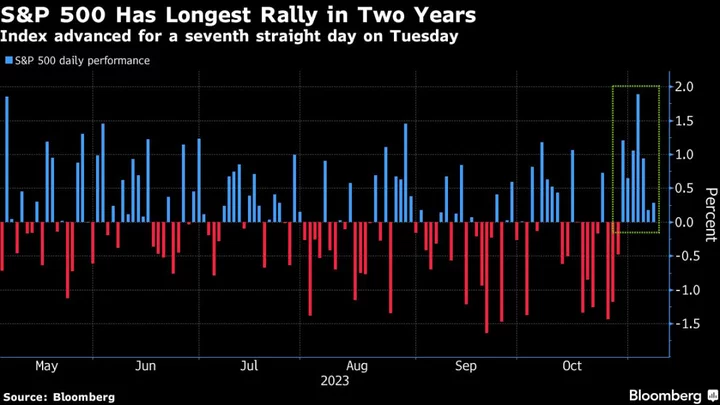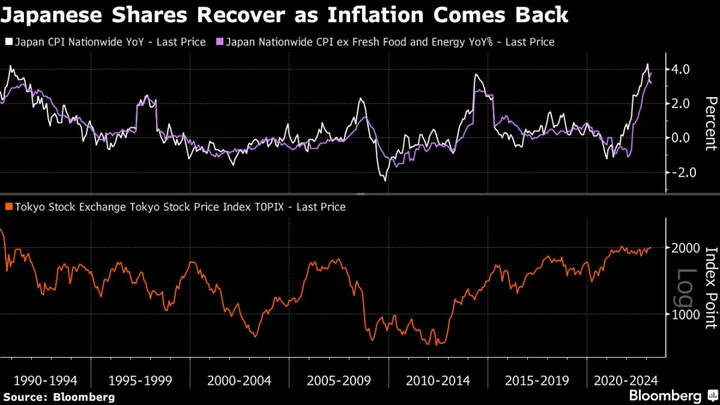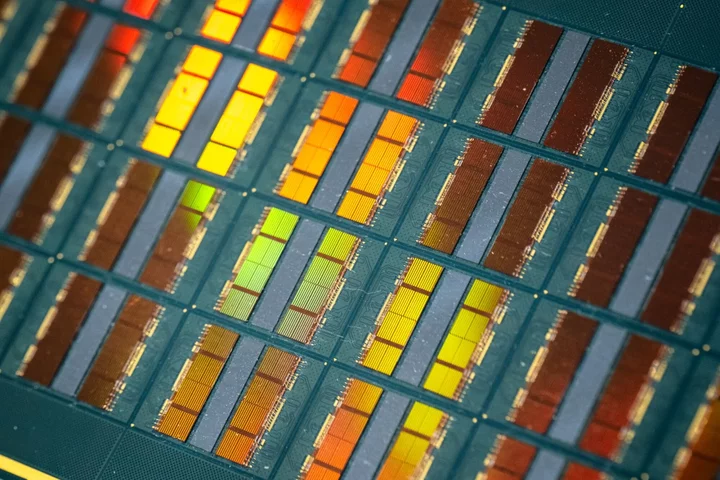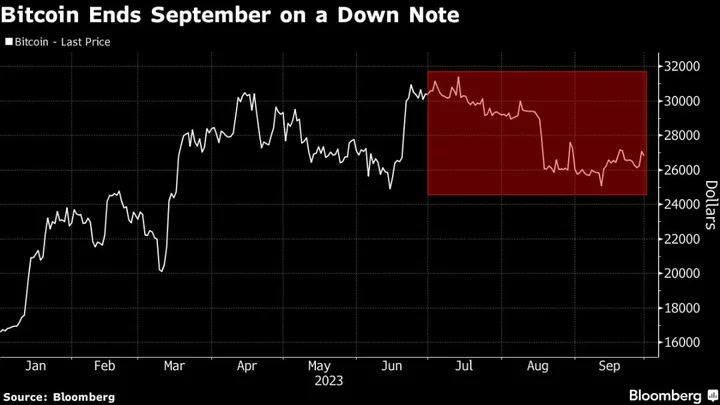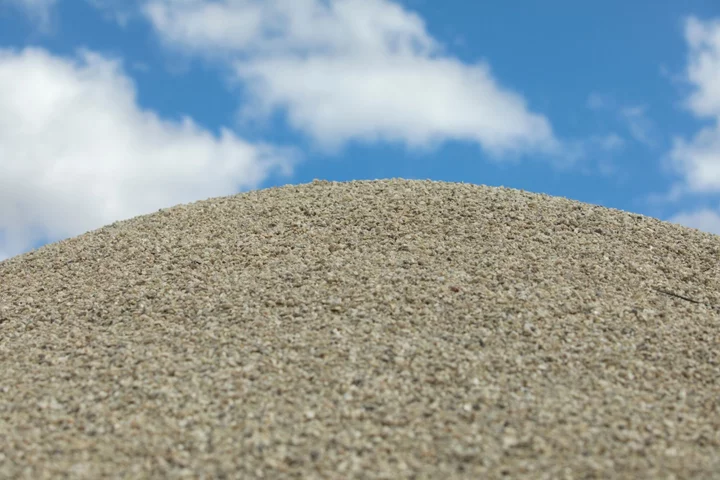Israel’s Prime Minister Benjamin Netanyahu said he won’t pursue the entire judicial overhaul originally planned by his government, working only to change the makeup of the judge selection committee while abandoning any other steps.
“That’s basically what’s left — because other things I think we should not legislate,” Netanyahu said in an interview with Bloomberg Television in Jerusalem on Sunday. Asked about his next move, he said “it would probably be about the composition of the committee that elects judges.”
Netanyahu said he wanted to avoid extremes - either “the most activist judicial court on the planet” or a legislature that can “just knock out any decision that the court makes.”
“There has to be a balance. That’s what we’re trying to restore,” he said.
In the interview, Netanyahu sought to project an image of a leader who remains above the political fray as he faces off against the largest anti-government protest movement in the nation’s history. The prime minister was also keen to send a reassuring message to markets unsettled by months of turmoil, calling Israel “undervalued.”
“You should invest in Israel,” he said. “Smart money is coming into Israel now.”
Walking Away?
Netanyahu’s decision to back away from the rest of the judicial package — something he’s not stated explicitly before — appears to signal a concession that would be a significant victory for those who’ve spent months demonstrating against the planned changes.
Other steps announced by his government as it took office in January included granting parliament the power to overrule the Supreme Court when it strikes down legislation it considered unconstitutional, and permitting government ministers to appoint their own legal advisers rather than the current system of independent overseers.
Giving the government more control over the selection of judges would still be a step too far for many in Israel, especially after the government in July removed another judicial tool to curb the oversight powers of the courts.
Netanyahu, 73, came back to power after elections last year by forming a pact with far right, ultra-Orthodox and nationalist parties. The coalition soon rolled out plans to reduce the power of the courts, triggering mass protests from opponents who feared an erosion of the country’s democracy.
Though the effort was briefly suspended in March, negotiations to find a compromise between Netanyahu’s cabinet and the opposition eventually broke down.
Judges in Israel are selected by a committee of nine that includes three members of the Supreme Court, two members of the organized bar and four politicians, one of whom is traditionally from the opposition.
Netanyahu and his supporters, who consider the court to be a bastion of liberal activism, say that this system has allowed judges to play too big a role in choosing their successors. Instead, they want to increase the role of politicians and limit that of the justices and bar association.
Opponents say that because the legislature is controlled by the executive in Israel, the judiciary is the only real check on their policies. They say keeping the selection of judges professional rather than political is vital to protecting minorities and stopping populist policies.
In late July, parliament passed the law that prevents judges from voiding government decisions they deem “unreasonable” during a session that was boycotted by opposition lawmakers. Israel’s Supreme Court will hear an appeal against the new law on Sept. 12.
The government says it wants to negotiate with the opposition during the next two months when the Knesset is in recess. The opposition hasn’t accepted, though, saying that it would join if the government promised in advance not to push unilaterally through the Knesset any more changes to the judiciary.
‘Equitable Compromise’
“I hope that we don’t get into a constitutional crisis,” Netanyahu said. “I think we won’t. I think there’s a way of reaching an equitable compromise, which is what I’m trying to do now.”
The prime minister brushed aside some of the more incendiary comments made by members of his coalition as being outside his control while dismissing concerns that democracy is under threat.
“It’s nonsense in my view,” he said. “It’s not nonsense in their view. They’re generally concerned. And I think there’s a happy middle ground there.”
The rallies unleashed by the standoff have at times paralyzed transportation and services, even presenting a threat to Israel’s security as thousands of military reservists warn they’ll no longer volunteer for duty.
More than half a year of upheaval has also put Israel’s $520 billion economy through the political wringer.
The crisis additionally marked a sea change for investors. For years, Israel boasted a currency that was more likely to react to US stocks than to any shocks at home.
But this time, the turmoil has played out differently in markets that long seemed largely immune to politics, exposing local assets to volatility and making the shekel one of the five worst performers among a basket of expanded major currencies. Israel’s dollar bonds are also among the worst-performing in emerging markets this year, according to data compiled by Bloomberg.
“There’s noise in the short-term markets,” Netanyahu said. “There’s clarity in the long-term markets.”
The prime minister pointed to Israel’s strong fundamentals, such as its low budget deficit and government debt level, and singled out investments made by companies including Nvidia Corp.
Still, capital inflows to the technology sector have proven vulnerable. Private funding that poured into the tech sector was below $4 billion during the first half of the year, down by nearly a third from 2022 to a level not seen since 2018, according to data from Start-Up Nation Central, which tracks the industry in Israel.
Netanyahu said his priorities remain the same: “peace, prosperity, and security.”
“They’re all dependent on prosperity to have the ability to fund the defense needs that we have and to expand the peace,” he said. “The prosperity is based on Israel’s supreme technological prowess.”
Political uncertainty has spilled over into monetary policy by forcing more tightening than the central bank first envisaged. The Israeli currency has lost about 8% against the dollar since late January, making it harder to contain price pressures.
Governor Amir Yaron, who’s approaching the end of his five-year term, said last month the central bank is “determined to return inflation to its target and to ensure price stability in Israel.”
A vocal critic of the judicial overhaul, Yaron said he’ll announce his plans for the future around September.
Speaking in the interview, Netanyahu defended the central bank’s independence and praised the governor but said he has yet to decide if he’ll ask Yaron to stay on.
“I want to think about it — I haven’t had time,” the prime minister said. “I think he’s been an exceptional central bank director, and I think that’s a possibility that I’ll have to talk to him about.”
--With assistance from Galit Altstein.

